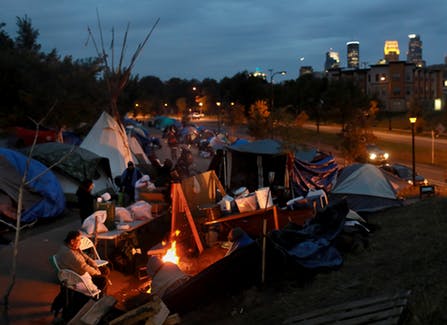The first Thanksgiving is typically depicted as white settlers coming together with Native peoples – this is an oversimplified narrative. It’s also a narrative that makes it easy for non-Native people, especially white people, to overlook the atrocities committed against Native communities, even ones unfolding today.
While we celebrate Thanksgiving, it’s important to recognize that we live among continually marginalized Indigenous communities who are excluded from our tables, and consider ways in which we can practice true generosity and reparations to lift up Native communities.
President Lincoln first declared a Thanksgiving holiday in 1863 as a celebration of Civil War victories in Gettysburg and Vicksburg, Mississippi. It was then that white New Englanders applied their retrospective lens on the feast gathering of 1621 at the end of the first settlers’ harvest and called it the first Thanksgiving. This feast day was indeed remarkable in that it brought white settlers and Indigenous people together over a meal, but this is not to say that the relationship was easy. It’s possible that the Wampanoag people weren’t explicitly invited. It's also possible that the holiday was in celebration of violence against Indigenous peoples; another account marks the first Thanksgiving in 1637, after the massacre of the Pequot people at the end of the Pequot War.
Minnesotans have much to account for. This accountability is slow, but it is coming. Perhaps the biggest atrocities stem from the hanging of the Dakota 38. After 38 Dakota men were hanged for alleged crimes against white settlers on December 26, 1862, their bodies were cut down and moved to a mass grave. W.W. Mayo, father of the founders of the Mayo Clinic, robbed the mass grave for a cadaver for his sons’ medical studies. Mayo stole the body of Dakota leader Marpiya te najin, dissected his body with colleagues and kept his bones in a kettle; the skeleton was displayed at the Mayo Clinic before being placed in storage and essentially forgotten.
But in September 2018, a representative of the Mayo Clinic presented a letter of apology to Marpiya te najin’s descendants for the desecration of their ancestor’s body and established a scholarship in his name. This apology and gesture of financial reparations was part of a dedication ceremony for the restoration of the original Dakota name of Minneapolis’ largest lake, Bde Maka Ska.
These apologies, these gestures, have meaning. By dismantling disrespectful memorials, by restoring the rightful names of the markers of the stolen land we live on, we honor the dignity of the people whose lives were lost to genocide, and we begin to balance the narrative that’s been whitewashed for the comfort of the dominant white culture.
This Thanksgiving, let’s not only practice gratitude for what we have: let’s consider the ongoing historical trauma and injustices against Indigenous communities. Let’s consider the Franklin/Hiawatha Encampment and understand the need for safety in community that the camp represents. Let’s reflect on the ways in which American culture and structures ignore Native communities and how we can work together to build peace. What can we do to help restore safety? What can we do to address the ongoing need for reparations?
We can ask Indigenous communities: What do they want to restore safety for their families? What do they want to repair the harm done to their communities? Let’s give them the resources they ask for and let them create change with wisdom, ingenuity, and brilliance.
As we seek to hold ourselves accountable, a good place to start is to become more informed. We invite you to learn more and make donations in the spirit of reparations to organizations working for justice in Native communities here in the Twin Cities:
- The Franklin/Hiawatha Encampment website gives an informative history of the encampment’s land and provides news and updates about the camp.
- MN Indian Women’s Resource Center (MIWRC) uses funds to provide families and individuals with basic clothes and household goods.
- Native American Community Clinic (NACC) provides medical-related services to residents of the camp.
- Indigenous Peoples Task Force (IPTF). Donations are used for HIV, HCV and other testing/screening of residents at the camp.
- American Indian Community Development Corporation. Donations will help secure permanent housing for residents of the camp.
- American Indian OIC provides job training to Native residents.
- Natives Against Heroin uses donated funds to provide daily frontline support to the residents of the encampment.
- The Ogitchidakwe Council fiscal agent of Mending The Sacred Hoop uses funds to create a circle of safety to end sexual violence against Native women.
As we enter the season of gratitude and giving, let’s shower our Native sisters and brothers with financial resources so they can use their talents to build peace within their spheres of influence. And together, we will transform our community peace by peace. This is peacebuilding, and it is worth being grateful for.


 RSS Feed
RSS Feed